
Must Read: Read This Before Using Link Exchange For Your Law Firm

So you're considering link exchanges as part of your web strategy, perhaps because of reading an internet article about how when you exchange links, your search engine rankings go up. When 90 percent of web searchers don't ever click through to the second page of search results, it's obviously critical to maintain great rankings. But is link exchange the way to do it? In this guide, you'll learn the basics of why and how people exchange links for search engine optimization purposes, and why link exchanges have been forced to change and even shut down due to new developments in search engine technology.
Why Do People Exchange Links?
Usually, when more people are linking to a website, it's a very good indicator that they believe it to be trustworthy and authoritative. More people link to a prestigious, well known law blog like The Volokh Conspiracy than link to a relatively unknown law blog run by a personal injury solo practitioner in Ames, Iowa, and Google took notice of this kind of pattern. It started awarding higher search rankings to websites that could show a large number of inbound links that were indexed by Google.
As people realized that the number of inbound links they had was critical—even more so than keyword density—to search rankings, they started developing strategies for deliberate link building. However, it can be difficult to get links put up on websites by hand—it takes a little bit of time, and what are you giving back for it? Since Google actively discourages the buying and selling of links (to the point of completely de-listing known link selling operations from searches), people came up with an ingenious idea: link exchange.
Link exchanges seemed like a win-win situation in the beginning. Now, anyone could get as many links as they wanted. It became even easier to exchange links when clever programmers began automating the process. Automated link exchange, though, changed the game a bit. Anyone—even a terrible spammer—could use link exchanges and suddenly have prominent search results. This wasn't the result Google wanted to encourage, so it started using some policies to regulate how people exchange links.
Is it a Good Idea to Exchange Links?
Today, using link exchange is actually of very limited utility. You can still use link exchanges on the web, but most of these no longer really work. If you pass a threshold percentage for reciprocal (exchanged) links, Google will simply no longer count the additional “link juice” of more reciprocated links, no matter how many thousands of links you're building.
This means that more than anything, it's a big waste of time today to exchange links on an industrial scale. You'd be much better off focusing on organic link building efforts and improving your content for people to link to.
Can I Still Do Link Exchange With Friends or Colleagues?
The one exception to the “link exchanges are now useless” rule is when you're reciprocating links with people you actually know personally. Linking to other professionals and getting them to link to you is a good way to build your network of connections. However, doing this type of link exchange isn't really geared toward getting you amazing search engine optimization results directly. Instead, it's designed to make sure that you are connecting to more people who will then, in turn, want to supply you with much-needed organic, contextual one way links.
These links are much more valuable to you than the single tiny drop of link juice they initially give you. If you're able to make your content go viral, it'll be much easier to get people to your blog or main firm website.
Analyzing Your Link Exchange Numbers
If you want to make sure that you're not using too many link exchanges, you may want to run a link checker that examines your backlinks and gives you a report about how many of your links are reciprocal versus one way. If you find that a very large number of your links are from reciprocal link exchange, you have two different ways that you can fix it.
The first is to ask for some of your links to be removed. Inform webmasters that you no longer wish to exchange links with them and are changing your search engine optimization strategy. Even if they refuse, Google will generally accept proof of your good faith effort as sufficient reason to turn the link juice faucet back on for you.
The other way that you can reduce your percentage of link exchanges is, of course, to increase the number of one way links going to your website. If you use this strategy, use extreme caution: increasing your one way inbound links too quickly can attract negative Google attention just as fast as overuse of link exchanges.
Finding Alternatives to Link Exchange
Once you start to exchange links as your primary search engine optimization method, it can be tough to find an alternative. Instead of using a link exchange, you should consider focusing your search engine marketing on the biggest trends for contemporary websites. Social networks like Twitter and Facebook have come to dominate much of the internet, and you will get a lot more link juice from using these websites appropriately than you will from an exchange of links.
Another way to make your SEO better without having to exchange links: social bookmarking sites. These sites allow people to socially share, rather than exchange, links that they find interesting and relevant. Anyone can post a link to these websites, and they are quickly taking on the role that link exchanges used to play.
Possible Penalties for Link Exchange
If you decide to persist in the exchange of links even after you are penalized by Google, several things may happen. In most cases, Google will simply not allow you to generate more link juice, which will cause you to slowly slide down the rankings ladder. However, if you're clearly abusing link exchanges, the links could actually start having a negative value. It's better not to risk it. It's no longer enough to just exchange links—and trying to exchange them is so unlikely to help that it's hard to see any value in doing it.


















